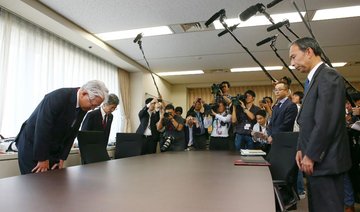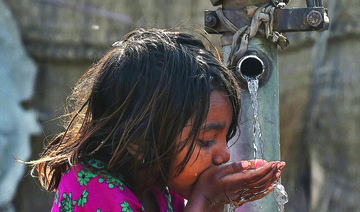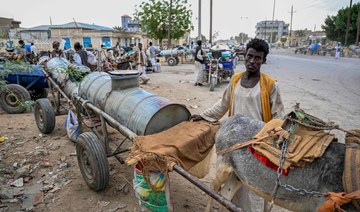KOBE, Japan: The fresh university graduate, eager to make a good impression on the job at one of Kobe Steel’s main plants in Japan, punched the wrong measurements into machines making steel pipes, causing a large batch to come out too short.
“I thought I was going to be fired,” recalled the former employee nearly 40 years later. But Shinzo Abe, now Japan’s prime minister, stayed on the job at Japan’s third-largest steelmaker for three years before entering politics in 1982.
Abe has called the steel industry the backbone of the nation. Kobe Steel, a 112-year-old company in south-central Japan’s Hyogo prefecture, has risen from wartime devastation and natural disaster but its past is littered with examples of corporate misconduct.
Its admission last month that workers had tampered with product specifications for at least a decade is the latest in a string of scandals that has battered Japan’s reputation as a manufacturing powerhouse.
Clients around the world, including top carmakers and airplane manufacturers, have been scrambling to check whether the safety or performance of their products have been compromised.
Workers, executives and shopowners in Kobe, a gritty, industrial city bordered by sloping hills where cattle are bred for the famed Kobe beef, said they were concerned but not surprised by the scandal.
Kobe Steel, which has apologized for the tampering, declined comment for this article.
“The corporate culture was to look the other way even while you saw what was going on,” said a retired employee who worked at the company’s flagship steel plant, Kobe Works — a symbol of the city’s quick recovery from a 1995 earthquake that killed more than 5,000 people. The company’s other main plant in the area is Kakogawa Works, in the nearby city of Kakogawa.
“They were supposed to be instilling a culture that paid attention when improprieties were discovered,” the former employee said. “In the end they didn’t create such a corporate culture. That’s management’s responsibility.”
The company initially said some workers had falsified data on contract specifications for a relatively small amount of aluminum and copper products, but it later admitted the problem had spread.
In 2006, Kobe Steel admitted falsifying soot-emissions data from the blast furnaces at Kobe Works and Kakogawa Works.
The latest scandal reflects “exactly the same set-up,” said Shoichi Tarumoto, who was then mayor of Kakogawa. “It looks like nothing has changed at Kobe Steel.”
Kobe Steel has admitted taking part in bid-rigging for a bridge project in 2005, and failing to report income to tax authorities in 2008, 2011 and 2013. The company exceeded established limits for ground and water pollution in 2006.
Illegal political funding to candidates in local assembly elections in 2009 prompted the resignations of the then CEO and chairman. And last year Kobe Steel admitted a subsidiary falsified data on stainless-steel products.
A senior official in local government who has dealt with the company for years said: “Kobe Steel always scouts the backstreets for shortcuts. That’s their nature.”
Although its local dominance has waned, Kobe Steel remains one of only two Kobe-based companies, along with Kawasaki Heavy Industries, that have revenues over ¥1 trillion a year. The Kakogawa Works is that city’s biggest company, vital as a local taxpayer and employer.
More than a third of the Kobe Steel group’s 6,123 domestic customers are concentrated in Hyogo or neighboring Osaka, according to credit-research firm Teikoku Databank. More than half its customers are small and midsize Japanese companies.
The other clients are spread around the world and include top automobile manufacturers, airplane makers, railways and nearly any industry that uses steel, aluminum or copper in any form.
No safety issues have been found so far because of the tampering, but Kobe Steel has withdrawn its forecast for its first annual profit in three years. Whatever the eventual economic impact, the scandal is already affecting morale in Kobe city.
“If Kobe Steel suffers a blow, this is the area that will be most affected,” said Tsuyoshi Matsuda of Teikoku Databank’s Kobe office.
Kobe Steel acknowledges some customers have shifted orders to other suppliers. Major banks are instructing their Kobe area branches to keep close watch on the credit management at companies that do business with the steelmaker, bankers say.
Scandal-hit Kobe Steel has a “look the other way” culture, hometown residents say
Scandal-hit Kobe Steel has a “look the other way” culture, hometown residents say

Saudi Arabia’s inflation holds steady at 1.6% in May: GASTAT

RIYADH: Saudi Arabia’s inflation rate rose marginally by 0.2 percent in May compared to the previous month, driven by changes in housing prices, official data showed.
According to the report by the General Authority for Statistics, expenses for housing, water, electricity, gas, and other fuels increased by 0.4 percent month-on-month in May.
The monthly inflation index was also impacted by expenses for food and beverages, which went up by 0.7 percent in May compared to April.
Additionally, expenses for restaurants and hotels edged up by 0.2 percent, while costs for personal goods and services increased by 0.1 percent month-on-month in May.
On the other hand, prices for clothing and footwear dipped by 0.6 percent in May compared to the previous month, while costs for transportation edged down by 0.4 percent.
The report further pointed out that prices of education, furnishing and home equipment, and tobacco products did not show any significant change in May compared to April.
Annual inflation rises
On a yearly basis, Saudi Arabia’s Consumer Price Index increased by 1.6 percent in May compared to the same period last year.
GASTAT attributed this rise to a 10.5 percent increase in actual housing rents, influenced by a 14.3 percent increase in apartment rents.
“This increase had a significant impact on maintaining the annual inflation rate for May 2024, due to the substantial weight of this category at 21 percent,” said the authority in the report.
Similarly, costs of food and beverages increased by 1.4 percent, driven by a 6.9 percent rise in vegetable prices.
On the other hand, prices of furnishing and home equipment decreased by 3.8 percent.
Similarly, expenses for clothing and footwear decreased by 4 percent year-on-year in May, while transport costs also decreased by 2.4 percent during the same period.
Wholesale price index increases
In another report, GASTAT revealed that Saudi Arabia’s Wholesale Price Index increased by 3.2 percent in May compared to the same month of the previous year.
This increase is mainly driven by a 14.5 percent rise in prices of basic chemicals and a 12 percent increase in the costs of refined petroleum products, the authority added.
Similarly, prices of food products, beverages, tobacco, and textiles rose by 1.8 percent year-on-year in May, due to a 7.4 percent increase in the prices of leather, leather products, and footwear.
Compared to April, the Kingdom’s WPI decreased by 0.1 percent in May, driven by a 0.3 percent drop in the prices of food products, beverages, tobacco, and textiles.
Water crisis batters war-torn Sudan as temperatures soar

- The country at large, despite its many water sources including the mighty Nile River, is no stranger to water scarcity
- This summer, the mercury is expected to continue rising until the rainy season hits in August
PORT SUDAN, Sudan: War, climate change and man-made shortages have brought Sudan — a nation already facing a litany of horrors — to the shores of a water crisis.
“Since the war began, two of my children have walked 14 kilometers (nine miles) every day to get water for the family,” Issa, a father of seven, said from North Darfur state.
In the blistering sun, as temperatures climb past 40 degrees Celsius (104 degrees Fahrenheit), Issa’s family — along with 65,000 other residents of the Sortoni displacement camp — suffer the weight of the war between Sudan’s army and the paramilitary Rapid Support Forces (RSF).
When the first shots rang out more than a year ago, most foreign aid groups — including the one operating Sortoni’s local water station — could no longer operate. Residents were left to fend for themselves.
The country at large, despite its many water sources including the mighty Nile River, is no stranger to water scarcity.
Even before the war, a quarter of the population had to walk more than 50 minutes to fetch water, according to the United Nations.
Now, from the western deserts of Darfur, through the fertile Nile Valley and all the way to the Red Sea coast, a water crisis has hit 48 million war-weary Sudanese who the US ambassador to the United Nations on Friday said are already facing “the largest humanitarian crisis on the face of the planet.”
Around 110 kilometers east of Sortoni, deadly clashes in North Darfur’s capital of El-Fasher, besieged by RSF, threaten water access for more than 800,000 civilians.
Medical charity Doctors Without Borders (MSF) on Friday said fighting in El-Fasher had killed at least 226.
Just outside the city, fighting over the Golo water reservoir “risks cutting off safe and adequate water for about 270,000 people,” the UN children’s agency UNICEF has warned.
Access to water and other scarce resources has long been a source of conflict in Sudan.
The UN Security Council on Thursday demanded that the siege of El-Fasher end.
If it goes on, hundreds of thousands more people who rely on the area’s groundwater will go without.
“The water is there, but it’s more than 60 meters (66 yards) deep, deeper than a hand-pump can go,” according to a European diplomat with years of experience in Sudan’s water sector.
“If the RSF doesn’t allow fuel to go in, the water stations will stop working,” he said, requesting anonymity because the diplomat was not authorized to speak to media.
“For a large part of the population, there will simply be no water.”
Already in the nearby village of Shaqra, where 40,000 people have sought shelter, “people stand in lines 300 meters long to get drinking water,” said Adam Rijal, spokesperson for the civilian-led General Coordination for Displaced Persons and Refugees in Darfur.
In photos he sent to AFP, some women and children can be seen huddled under the shade of lonely acacia trees, while most swelter in the blazing sun, waiting their turn.
Sudan is hard-hit by climate change, and “you see it most clearly in the increase in temperature and rainfall intensity,” the diplomat said.
This summer, the mercury is expected to continue rising until the rainy season hits in August, bringing with it torrential floods that kill dozens every year.
The capital Khartoum sits at the legendary meeting point of the Blue Nile and White Nile rivers — yet its people are parched.
The Soba water station, which supplies water to much of the capital, “has been out of service since the war began,” said a volunteer from the local resistance committee, one of hundreds of grassroots groups coordinating wartime aid.
People have since been buying untreated “water off of animal-drawn carts, which they can hardly afford and exposes them to diseases,” he said, requesting anonymity for fear of reprisal.
Entire neighborhoods of Khartoum North “have gone without drinking water for a year,” another local volunteer said, requesting to be identified only by his first name, Salah.
“People wanted to stay in their homes, even through the fighting, but they couldn’t last without water,” Salah said.
Hundreds of thousands have fled the fighting eastward, many to the de facto capital of Port Sudan on the Red Sea — itself facing a “huge water issue” that will only get “worse in the summer months,” resident Al-Sadek Hussein worries.
The city depends on only one inadequate reservoir for its water supply.
Here, too, citizens rely on horse- and donkey-drawn carts to deliver water, using “tools that need to be monitored and controlled to prevent contamination,” public health expert Taha Taher said.
“But with all the displacement, of course this doesn’t happen,” he said.
Between April 2023 and March 2024, the health ministry recorded nearly 11,000 cases of cholera — a disease endemic to Sudan, “but not like this” when it has become “year-round,” the European diplomat said.
The outbreak comes with the majority of Sudan’s hospitals shut down and the United States warning on Friday that a famine of historic global proportions could unfold without urgent action.
“Health care has collapsed, people are drinking dirty water, they are hungry and will get hungrier, which will kill many, many more,” the diplomat said.
Pakistan’s Muhammad Yasir bags silver medal in Asian Throwing Championship

- Yasir threw javelin at impressive distance of 78.10 meters to finish second behind Sri Lanka’s Rumesh Tharanga
- Tharanga threw his javelin at distance of 85.45 meters to win the competition, reports Associated Press of Pakistan
ISLAMABAD: Pakistani athlete Muhammad Yasir bagged a silver medal in the second Asian Throwing Championship competition held in South Korea on Saturday, state-run media reported.
The Asian Throwing Championships is an annual competition featuring participants from Asian countries in track and field competitions such as javelin throw, discus throw, shot put and hammer throw.
Yasir finished second behind Sri Lana’s Rumesh Tharanga, who threw an impressive 85.45 meters while Yasir managed to throw the javelin at a distance of 78.10 meters.
“Talented Pakistani athlete Muhammad Yasir has secured a silver medal in the 2nd Asian Throwing Championship held in Korea,” the state-run Associated Press of Pakistan (APP) said.
The Pakistan Athletics Federation (PAF) congratulated Yasir and his coach, Syed Fayaz Hussain Bukhari, for their outstanding achievement.
“PAF President Brig (R) Wajahat Hussain and Secretary General Col (R) Shahjahan Mir praised the duo’s dedication and hard work,” APP said.
It added that Yasir and Bukhari are both scheduled to return home on June 18 and will be accorded a warm welcome at the airport.
UAE, Iran discuss bilateral relations

DUBAI: The United Arab Emirats Minister of Foreign Affairs, Sheikh Abdullah bin Zayed, had a phone conversation on Saturday with Iran's acting Minister of Foreign Affairs, Ali Bagheri Kani, to discuss the bilateral relations between the two countries.
During the call, they exchanged Eid Al-Adha greetings and explored ways to enhance cooperation that would serve the mutual interests of their countries and peoples, contributing to regional security and stability.
They also reviewed several issues of common interest, as well as recent developments in both regional and international arenas.
Two explosions near vessel off Yemen’s coast, UK maritime office says

- Houthi militants, who are backed by Iran, have been targeting vessels off the Yemen’s coast
CAIRO: The United Kingdom Maritime Trade Operations (UKMTO) said on Sunday a vessel 40 nautical miles south of Al-Mukha in Yemen had reported two explosions nearby, adding that the vessel and its crew were safe and proceeding to their next port of call.
Authorities are investigating, UKMTO said.
UKMTO WARNING INCIDENT 087 ATTACK UPDATE 001https://t.co/fX3hWupi7g#MaritimeSecurity #MarSec pic.twitter.com/tOQXLZoQ9w
— United Kingdom Maritime Trade Operations (UKMTO) (@UK_MTO) June 16, 2024
Houthi militants, who are backed by Iran, have been targeting vessels off the Yemen’s coast in what they said is a show of solidarity with the Palestinians being killed in Israel’s war on Gaza.

















